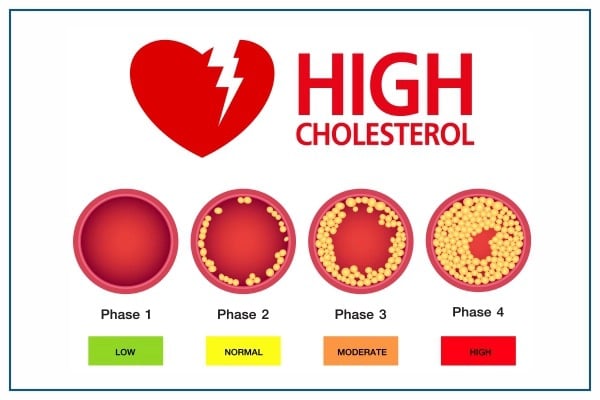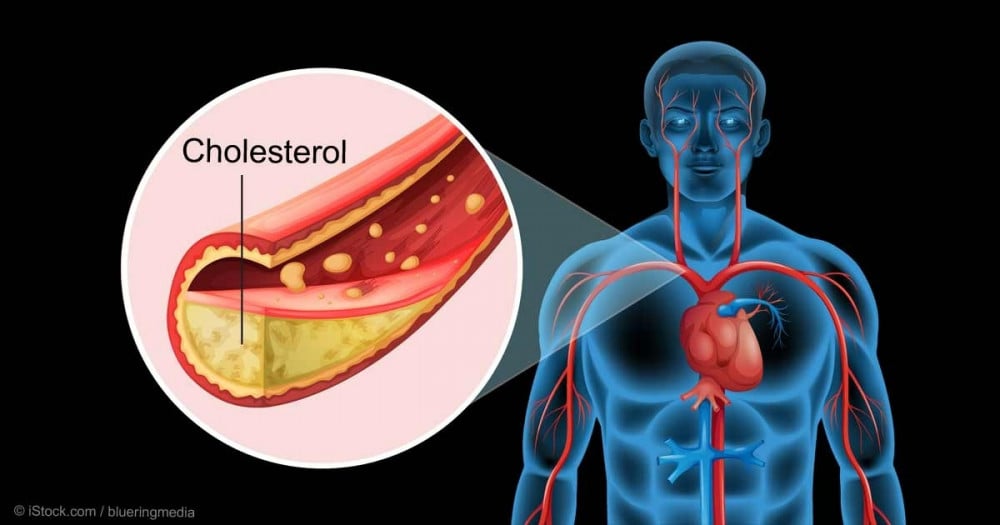What is cholesterol?
Cholesterol is a waxy substance found in the blood. Your body needs cholesterol to build healthy cells, but high levels of cholesterol can increase your risk of heart disease.
With high cholesterol, fatty deposits can develop in the blood vessels. Eventually, these deposits grow, making it difficult for adequate blood flow through the arteries. Sometimes, these deposits can suddenly burst and form a clot that causes a heart attack or stroke.
High cholesterol can be hereditary, but it is often the result of unhealthy lifestyle choices, making it preventable through a healthy diet, regular exercise, and sometimes medications to reduce high cholesterol.
Cholesterol is transported in the blood bound to proteins. This combination of proteins and cholesterol is called lipoprotein. There are different types of cholesterol, based on what the lipoprotein carries. they:
- Low-density lipoprotein (LDL), the “bad” cholesterol, transports cholesterol molecules throughout the body. Low-density lipoprotein cholesterol builds up in the walls of your arteries, making them stiff and narrow.
- High-density lipoprotein (HDL). “Good” cholesterol, picks up excess cholesterol and returns it to the liver.

Symptoms:
High cholesterol has no symptoms. A blood test is the only way to detect it.
When should you go to the doctor?
According to the National Heart, Lung, and Blood Institute (NHLBI), your first cholesterol screening should be done between the ages of 9 and 11, and then repeated every five years after that.
The NHLBI recommends cholesterol screenings every one to two years for men ages 45 to 65 and women ages 55 to 65. People over the age of 65 should have cholesterol tests annually.
If your test results are not within the desired ranges, your doctor may recommend more frequent measurements. Your doctor may also suggest more frequent testing if you have a family history of high cholesterol, heart disease, or other risk factors, such as diabetes or high blood pressure.
The blood test also measures triglycerides, a type of fat in the blood. High triglyceride levels can also increase the risk of heart disease.
Factors you can control — such as inactivity, obesity and an unhealthy diet — contribute to harmful cholesterol and triglyceride levels. Factors outside your control may also play a role. For example, your genetic makeup may make it difficult for your body to remove low-density lipoprotein cholesterol from the blood or break it down in the liver.
Medical conditions that can cause unhealthy cholesterol levels include:
- Kidney failure
- Diabetes
- HIV
- Hypothyroidism
- Lupus.
Cholesterol levels can also be raised by some types of medications you may be taking for other health problems, such as:
- young love
- cancer
- high blood pressure
- Arrhythmia
- HIV
Factors that can increase your risk of unhealthy cholesterol levels:
- Poor nutrition
- Obesity
- Lack of exercise
- Smoking
- Alcohol
- the age.
Complications:
High cholesterol can cause a dangerous buildup of cholesterol and other deposits on the walls of your arteries (atherosclerosis). These deposits can reduce blood flow through the arteries, which can cause complications, such as:
- heart attack
- Apoplexy
To prevent cholesterol:
To help prevent high cholesterol, you can:
- Eat a low-salt diet that emphasizes fruits (low-sugar), vegetables, and whole grains.
- Reduce the amount of animal fats and use good fats in moderation.
- Lose weight and maintain a healthy weight
- Quit Smoking
- Exercise at least 3 to 4 days a week
- Control stress
After this article, we have certainly all learned about the harmful effects of high cholesterol and we must be careful of it, so it would be a great option if we added it to our daily meals. Mr. Kim's noodles contain only 0.4 grams of fat, and this is what makes them distinct from other noodles. You can also benefit from the benefits of soup and replace cooked soup, which contains a lot of fat, with Life soup with its different wonderful flavors.
the reviewer :

